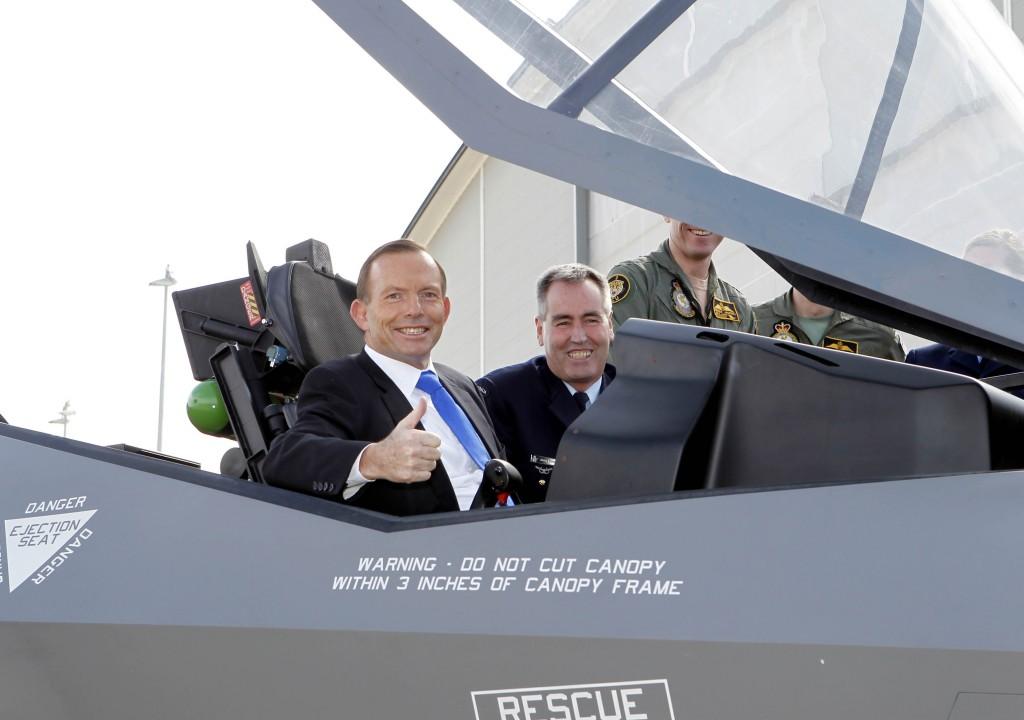Last Wednesday, the Prime Minister and Defence Minister travelled to Fairbairn airbase to announce Cabinet had approved the purchase of a further 58 F-35 Joint Strike Fighters at a cost of $12.4 billion. It should have been a red-letter day for the Abbott government; an election promise fulfilled, Australia’s defences strengthened, and work aplenty for local industry. But it didn’t quite work out that way.
To start with, confusion abounded at the press conference about where the money was going to come from. An increasingly perplexed media tried to make sense of statements like
…this is not new money, it’s money which successive governments have carefully put aside to ensure that our nation’s defences are strong.
We have been putting the money away, a line item called ‘air combat capability’ and it’s been there, it’s been building up and it’s in the Budget.
So, this is not new spending today, in the context of a tough Budget, this is spending money that we need to spend that has been sensibly put aside in the past to ensure that our nation’s defences remain strong.
The successive quotes (there are more I could’ve used) reflect persistent questioning by incredulous journalists. You can read the transcript for yourself here.
As best I can tell, the Prime Minister and Defence Minister were forthright and honest in their answers. For anyone versed in the arcane world of government finance and its curious terms-of-art, the responses make perfect sense. Trouble is, few people are initiated into that club—hence the confusion. More importantly, the media were actually onto something. Let me explain.
There’s no escrow account or trust fund designated ‘air combat capability’. Rather, the notion of money ‘put aside in the past’ refers to a planning provision made in prior years. That is, Defence’s forward financial plan has for many years included a provision to acquire the F-35 around the latter half of this decade. No actual funds have been deposited anywhere, but within the overall funding promised to Defence an allowance has been made for the purchase of the F-35.
Moreover, there’s nothing special about planning provision for the F-35 acquisition. There are similar provisions made in Defence’s financial plan for personnel expenses, fuel, ammunition, gold braid etc., just as there are provisions in the government’s broader financial plan for pensions, hospitals and schools in the years ahead.
By saying ‘this is not new money’, all that’s meant is that the aircraft will be purchased from within the existing funding planned for Defence.
So far so good. But the iron rule of government spending is that each dollar can be spent only once. Every dollar spent on defence is unavailable for spending on health or education or pensions. And on this count, the journalists’ instincts were on target. The money to pay for the F-35 aircraft is yet to be raised by taxes—in fact it’s yet to be earned by taxpayers. Just because someone entered some numbers into a spreadsheet a couple of years ago doesn’t erase the hard fact that the F-35 purchase will impose an opportunity cost in terms of either higher taxes/debt or reduced government spending elsewhere.
Which brings me to the second complication surrounding last Wednesday’s announcement; everybody knew the Treasurer was scheduled to give a speech that evening to make the case for a hard budget—and he delivered in trumps. The result was a bonanza for cartoonists , with Alan Moir, Andrew Dyson, and Ron Tandberg all having a go, and with David Pope weighing in twice (here and here). (My favorite was John ‘Polly’ Farmer’s effort for the Hobart Mercury, but it’s not available online.)
I expect that the government will think twice in future before it announces a multi-billion defence acquisition immediately prior to the Treasurer giving a speech with such choice quotes as ‘we are spending money we don’t have’ and ‘we must learn to live within our means’. But from my viewpoint it was the right thing to do—defence spending and the opportunity cost it imposes on society shouldn’t be sheltered from scrutiny.
On the contrary, just as the Treasurer presented a reasoned and evidence-based case for a hard budget, the government needs to take the same approach to explaining why Australia needs a strong defence. Unless they do, the promise of spending 2% of GDP on defence will prove to be as unsustainable as the budget position the Treasurer described last week.
Mark Thomson is senior analyst for defence economics at ASPI. Image courtesy of the Department of Defence.
